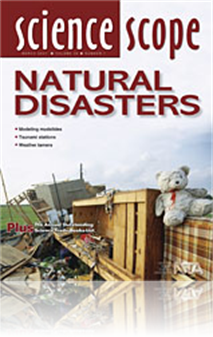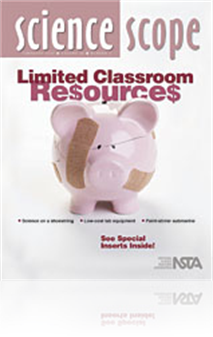All Science Scope resources
Journal Article
Science Sampler: Studying storms to understand weather
Who isn’t awed by the power, beauty, and destructive capabilities of a hurricane, tornado, or snowstorm? Storms are one of those topics that nearly all students are interested in, and by capitalizing on this interest and focusing on the big idea be...
Journal Article
Service learning is a pedagogy that has the potential to connect young adolescents with their community in authentic situations where they can initiate projects that address real needs. The use of the “community” as a context for service and lear...
Journal Article
Science Sampler: Frog dissection—An alternative model
Local dollar stores can be a treasure-trove of inexpensive items that are ideal for hands-on activities in the science classroom. This article describes one such activity in which a model frog that costs less than a dollar was used to allow students ...
Journal Article
The Station Approach: How to Teach With Limited Resources
The Station Approach is a method of instruction in which small groups of students move through a series of learning centers, or stations, allowing teachers with limited resources to differentiate instruction by incorporating students’ needs, intere...
Journal Article
Issues In-depth: Inside the rainforests of the sea—Coral reefs and their endangerment
For a science teacher, studying coral and coral reefs provides an opportunity to present numerous scientific concepts in an integrated manner. The concepts of radial symmetry, biodiversity, symbiosis, interdependence, endangerment, and climate change...
Journal Article
Science Sampler: Frugal equipment substitution—A quick guide
Is your school on a shoestring budget? If so, learn how to s—t—r—e—t—c—h it further by using the amazingly clever, economical substitutions shared by a veteran teacher in this article. This quick guide will help you to provide more hand...
Journal Article
Most of us have experienced the frustration of limited school science budgets, and many of us have had to resort to repeatedly dipping into our own personal funds to finance the material needs of our classrooms. With a little time and effort, you can...
Journal Article
Science Sampler: Walk this way
While they themselves may be in constant motion, getting middle school students to really understand the motion shown in distance/time graphs can often be a challenge—but a challenge that must be taken on! In virtually every listing of national and...
Journal Article
A local middle school requested that the Water Center of Advanced Materials for Purification of Water With Systems (WaterCAMPWS), a National Science Foundation Science and Technology Center, provide an introduction to pH for their seventh-grade water...
Journal Article
Science Sampler: A (minty) fresh approach to science fair projects
This class activity allows students to quickly “do” a class science fair project in order to see how it’s done. It's also a great way to introduce concepts of controlling variables and testing multiple subjects using an inexpensive breath mint....
Journal Article
Scope on the Skies: Other moons
Nearly 400 years ago, on January 7, 1610, Galileo Galilei turned his new telescope toward the planet Jupiter. In his notes and later in a publication titled Sidereus Nuncius, or The Sidereal Messenger, Galileo described his observations of Jupiter ...
Journal Article
The ability to engage in argumentation in order to construct, justify, and evaluate scientific explanations is seen by many as an important component of scientific literacy. In order to foster productive argumentation in science classrooms, the autho...
Journal Article
In today’s fast-paced, technological world, it is a constant struggle for teachers to find new and exciting ways to challenge and engage our students. The Paint-Stirrer Submarine is a unique and challenging laboratory exercise that keeps the studen...



